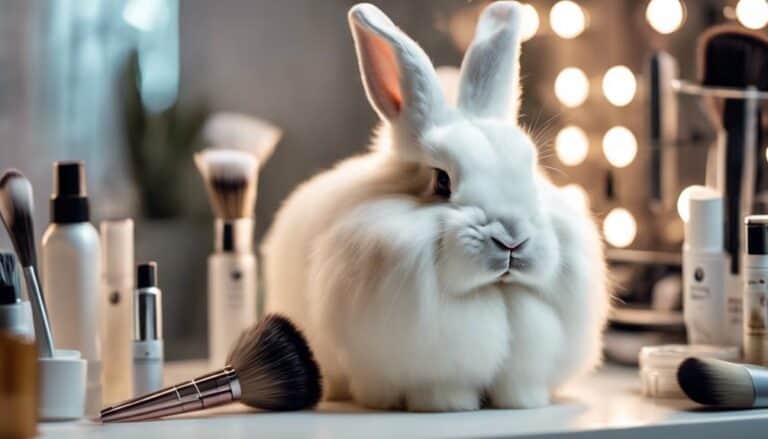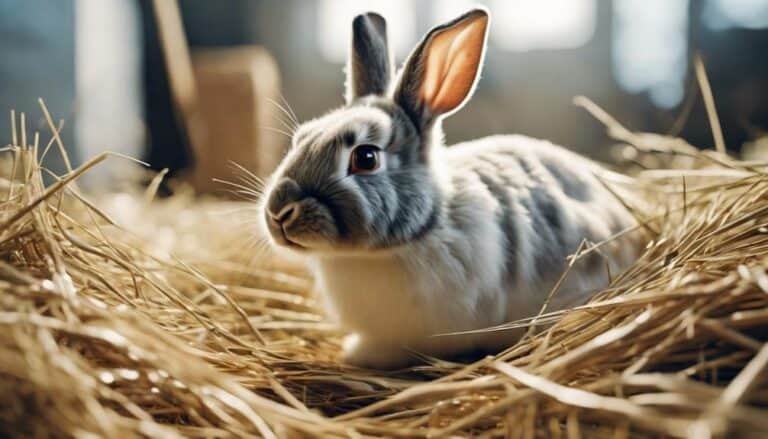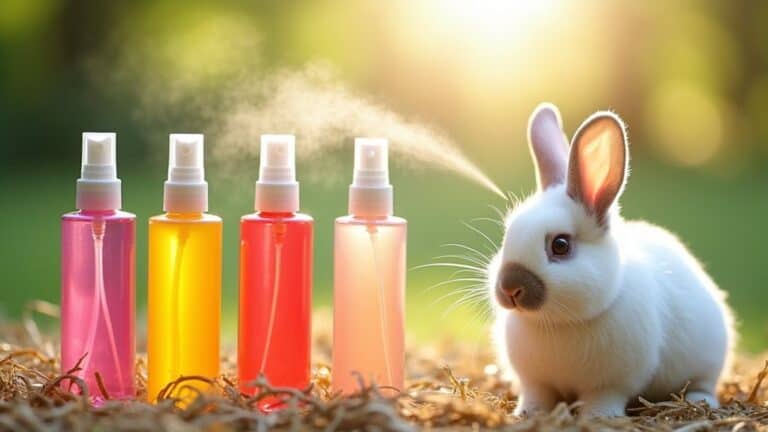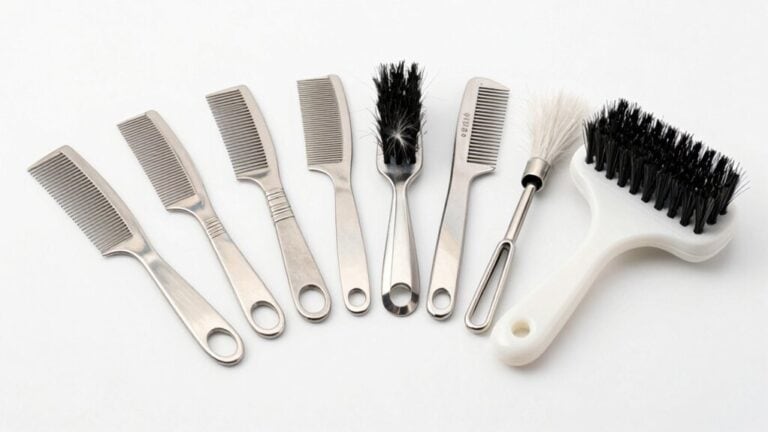Did you know that up to 85% of pet rabbits may develop dental problems at some point in their lives?
Understanding how to identify these issues early on can greatly impact your furry friend's well-being.
From subtle signs to more obvious symptoms, being vigilant about your rabbit's oral health is key to preventing potential complications.
By learning to recognize the common warning signals and knowing when to seek professional help, you can make sure that your rabbit maintains peak dental health.
Contents
- 1 Key Takeaways
- 2 Common Signs of Dental Problems
- 3 Physical Examination for Dental Issues
- 4 Types of Dental Diseases in Rabbits
- 5 Recognizing Overgrown Front Teeth
- 6 Identifying Overgrown Back Teeth
- 7 Understanding Tooth Root Abscesses
- 8 Spotting Tooth Injuries
- 9 Importance of Prompt Veterinary Attention
- 10 Frequently Asked Questions
- 11 How Can Dental Problems in Rabbits Affect Their Eating Habits?
- 12 Conclusion
Key Takeaways
- Watch for signs like weight loss and changes in appetite to detect dental issues early.
- Annual dental exams and physical evaluations are vital for maintaining a rabbit's oral health.
- Treatment options for dental problems include abscess drainage, antibiotics, and tooth extraction.
- Early intervention and preventive measures can prevent serious complications in rabbits with dental issues.
Common Signs of Dental Problems
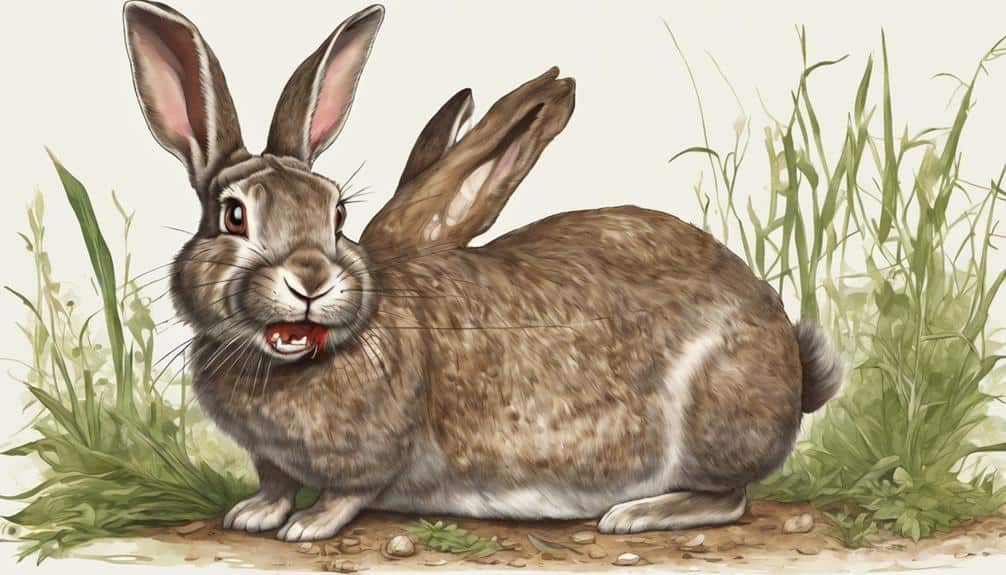
If you notice your rabbit experiencing weight loss, changes in appetite, excessive drooling, or behavioral alterations, these could be common signs indicating potential dental problems that require prompt veterinary attention. Dental issues in rabbits often stem from problems with their teeth, particularly the molars. Rabbits have continuously growing teeth, and if these teeth don't wear down properly through chewing, it can lead to overgrown molars. Overgrown molars can cause pain, difficulty eating, and subsequent weight loss in rabbits. Changes in appetite, such as reduced food intake or selective eating, may also be a result of dental problems like sharp edges on the teeth or abscesses.
Excessive drooling or wetness around the mouth is another sign of dental discomfort in rabbits. This could be due to tooth root elongation, which leads to pain and inflammation. Behavioral changes like aggression, lethargy, or reduced grooming can also be linked to dental pain. If your rabbit shows reluctance to chew on hay or hard foods, it may indicate dental issues that necessitate veterinary intervention to prevent further complications.
Physical Examination for Dental Issues
When conducting a physical examination to assess dental issues in rabbits, veterinarians meticulously inspect for overgrown incisors and molars. Checking for any abnormalities or sharp protrusions in the jaw area through palpation is essential to detect potential dental problems.
Visual evaluation of the molars is also necessary to assess wear patterns and alignment, looking for signs of malocclusion, where the teeth don't align correctly. In cases where a detailed examination is necessary, anesthesia might be required to accurately diagnose and treat any dental issues present in the rabbit.
Annual physical exams, including thorough dental checks, play a significant role in maintaining good oral health for rabbits. By being diligent in the dental exam process, veterinarians can identify and address any overgrown teeth or malocclusion issues promptly, ensuring the overall well-being of the rabbits they care for.
Types of Dental Diseases in Rabbits
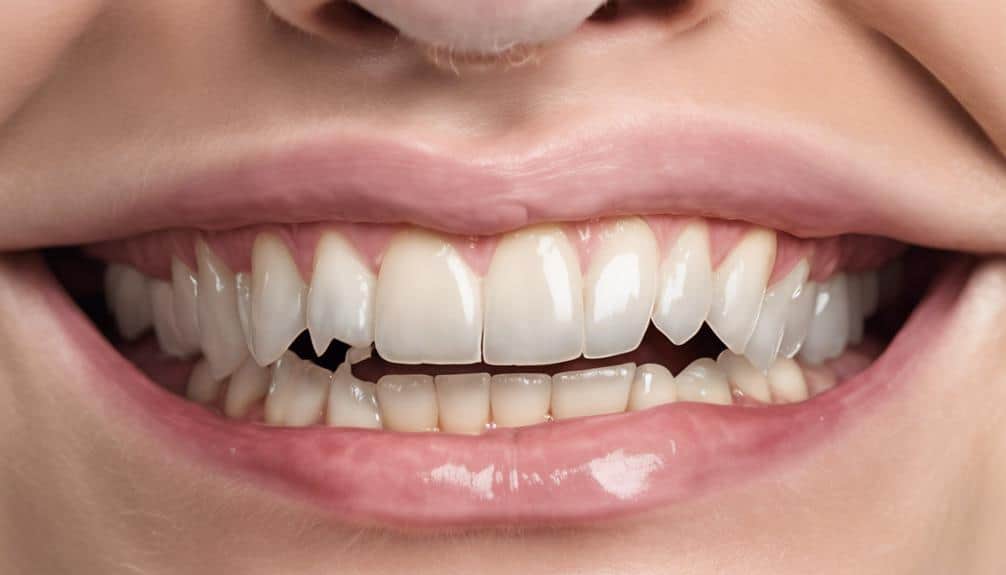
During a physical examination to evaluate dental issues in rabbits, veterinarians meticulously inspect for common types of dental diseases such as malocclusion, abscesses, overgrown teeth, and spurs.
Malocclusion, a misalignment of teeth, can lead to overgrowth and difficulty eating in rabbits.
Abscesses in rabbit teeth often result from infections or injuries, causing pain and swelling, requiring prompt treatment.
Overgrown teeth, if left untreated, can lead to oral sores, weight loss, and difficulty grooming in rabbits, affecting their overall health and well-being.
Spurs, sharp points that develop on teeth due to improper wear, can cause pain and discomfort for rabbits, impacting their ability to eat and chew properly.
Understanding these common dental problems in rabbits is essential for early detection and intervention to maintain the well-being of these small animals.
Regular veterinary check-ups are essential to monitor and address any dental issues promptly, helping rabbits lead healthy and comfortable lives.
Recognizing Overgrown Front Teeth
Identifying overgrown front teeth in rabbits requires careful observation and regular veterinary checks to prevent potential eating difficulties and discomfort. When examining your rabbit's dental health, pay close attention to the following:
- Elongated Incisors: Check if the upper incisors are protruding outside the mouth or if the lower incisors aren't aligning properly.
- Signs of Dental Disease: Look for symptoms like weight loss, drooling, or difficulty grooming, which could indicate acquired dental disease in rabbits.
- Prompt Veterinary Attention: Seek veterinary care immediately if you notice any of the above signs to prevent dental disease from progressing.
Regular dental check-ups can help catch overgrown front teeth early, allowing for appropriate treatment such as trimming or filing the incisors to restore proper alignment. By staying vigilant and proactive, you can help your rabbit maintain excellent dental health and overall well-being.
Identifying Overgrown Back Teeth

Overgrown back teeth in rabbits can cause significant pain and discomfort, impacting their overall well-being and eating habits. When a rabbit's back teeth become overgrown, it can lead to a disease known as dental malocclusion. Signs of overgrown back teeth include drooling, weight loss, reduced appetite, and difficulty eating. If left untreated, overgrown teeth can develop sharp points called dental spurs, which can cause oral sores and further discomfort for the rabbit.
To properly diagnose and treat overgrown back teeth, it's important to seek the expertise of a veterinarian. A thorough examination by a veterinarian is necessary to determine the extent of the overgrowth and develop a suitable treatment plan. Veterinarians have the necessary tools and knowledge to trim overgrown teeth safely and effectively, alleviating the rabbit's pain and restoring its ability to eat properly.
Regular dental check-ups are essential for rabbits to prevent severe issues with overgrown back teeth. By monitoring your rabbit's dental health and seeking veterinary care when needed, you can help verify your pet maintains good oral hygiene and overall well-being.
Understanding Tooth Root Abscesses
Tooth root abscesses in rabbits are often caused by bacterial infections that affect the roots of their teeth.
Watch for signs such as severe pain, swelling, and difficulty eating or grooming.
Treatment options may include surgical drainage, antibiotics, pain management, and potentially tooth extraction to address the infection.
Causes of Abscesses
What're the primary factors contributing to the development of tooth root abscesses in rabbits?
Tooth root abscesses in rabbits are typically caused by bacteria entering the tooth roots through fractures or infections inside your rabbit's mouth.
Here are the main causes:
- Infection Associated: Bacteria such as Pasteurella multocida and Staphylococcus aureus can infect the tooth roots, leading to abscess formation.
- Lower Teeth: Abscesses commonly affect the roots of the lower teeth due to their structure and proximity to the jawbone.
- Upper Teeth: Although less frequent, abscesses can also occur in the roots of the upper teeth, causing similar issues for your rabbit.
Understanding these causes can help rabbit owners take preventive measures to safeguard their pet's dental health.
Symptoms to Watch
When observing rabbits for signs of tooth root abscesses, keenly monitor for facial swelling, drooling, and difficulty eating as key indicators of potential dental issues. These symptoms often stem from problems with the front teeth (incisors) or the molars, either upper or lower. Since a rabbit's teeth grow continuously, dental problems can arise if they don't wear down correctly.
Additionally, loss of appetite can accompany tooth root abscesses due to the pain and discomfort experienced while eating. If you notice any of these signs in your rabbit, essential veterinary attention is vital to prevent further complications. Regular dental check-ups and monitoring your rabbit's eating habits can aid in early detection and treatment of tooth root abscesses.
Treatment Options Available
Considering the complexities of tooth root abscesses in rabbits, treatment options encompass a range of interventions aimed at addressing the infection, pain, and associated complications effectively. Here are key treatment options available:
- Abscess Drainage: Your vet may need to drain the abscess to remove pus and alleviate pressure.
- Antibiotics and Pain Management: Medications will be prescribed to combat the bacterial infection and manage pain.
- Tooth Extraction: In severe cases or if the abscess is caused by overgrown teeth, extraction might be necessary to prevent further issues.
Prompt veterinary attention is vital to prevent complications and ensure your rabbit's well-being. If you notice any symptoms, seek professional help promptly.
Spotting Tooth Injuries
To detect tooth injuries in rabbits, pay close attention to any signs of drooling, reluctance to eat, or pawing at the mouth. Rabbits have front teeth, called incisors, that grow continually throughout their lives.
If a rabbit experiences trauma, falls, fights, or chews on hard objects, it can lead to broken or fractured teeth. These injuries can cause pain and make it challenging for the rabbit to eat properly.
Regular veterinary check-ups are vital for examining your rabbit's teeth and detecting any issues early on. If you notice your rabbit eating less, drooling excessively, or showing discomfort when chewing, it could indicate a tooth injury.
Prompt identification and treatment of tooth injuries are essential to prevent further complications. When in doubt, always consult with a veterinarian experienced in rabbit dental care to address any concerns about your rabbit's oral health.
Importance of Prompt Veterinary Attention
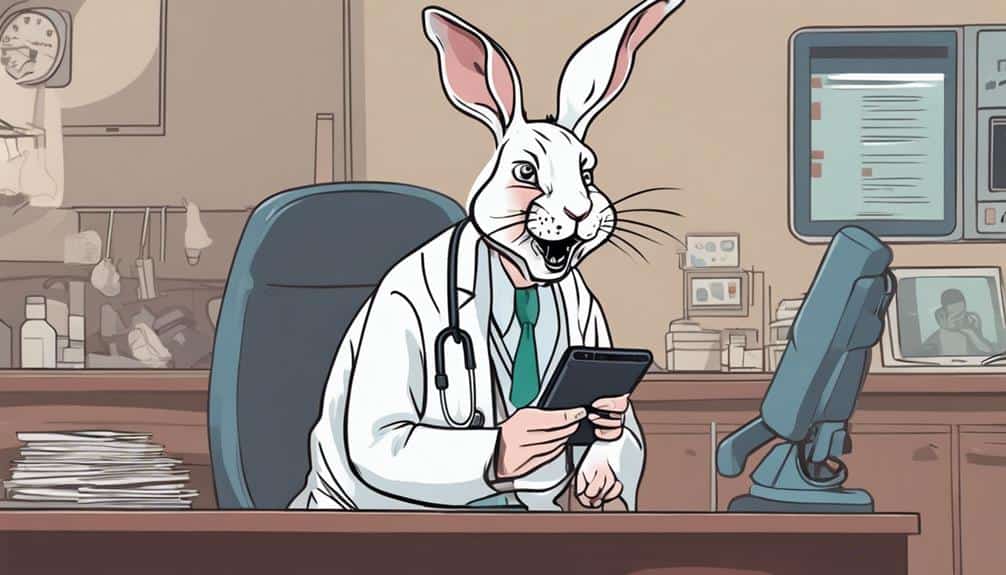
Prompt veterinary attention is imperative for accurately diagnosing and effectively treating dental problems in rabbits. When it comes to your rabbit's dental health, timely intervention can make a significant difference in their well-being. Here's why prompt veterinary care is critical:
- Early Detection: Veterinarians can identify dental issues such as overgrown incisors or malocclusion in the upper and lower teeth before they escalate.
- Professional Treatment: Veterinary expertise is essential for addressing complex dental problems in rabbits and providing appropriate care to alleviate pain and discomfort.
- Preventing Complications: Timely veterinary care can prevent further complications, ensuring your rabbit's teeth stay healthy and avoiding potential life-threatening conditions.
Frequently Asked Questions
How Can I Tell if My Rabbit Has Dental Problems?
To check if your rabbit has dental problems, watch for reduced appetite, weight loss, or drooling. Look for overgrown teeth, drooling, or runny eyes. Observe behavioral changes like reduced grooming. Regularly inspect their mouth and consult a vet for diagnosis and treatment.
What Is End Stage Dental Disease in Rabbits?
When dealing with end stage dental disease in rabbits, it's important to address severe pain promptly. Treatment may involve advanced dental procedures or tooth extractions. Nutritional support, pain management, and monitoring for complications are key.
What Are the Symptoms of Molar Spurs in Rabbits?
If you notice drooling, reduced appetite, or weight loss in your rabbit, it could indicate molar spurs. Regular vet check-ups can help catch these issues early. Treatment may involve filing the sharp points to ease pain and prevent complications.
Why Is My Rabbits Tooth Sticking Out?
When your rabbit's tooth is sticking out, it could be due to misalignment, causing tooth growth issues. Proper dental care, including regular veterinary check-ups, is important to maintain good oral health and address any teeth issues promptly to safeguard your rabbit's well-being.
How Can Dental Problems in Rabbits Affect Their Eating Habits?
Dental problems in rabbits can severely impact their bunnies eating habits explained. Overgrown teeth can cause difficulty in chewing, resulting in decreased appetite or selective eating. Pain from dental issues can lead to weight loss and overall poor health. Regular dental check-ups and a proper diet are crucial for maintaining a rabbit’s dental health.
Conclusion
Now that you're equipped with the knowledge to identify dental problems in rabbits, remember to stay vigilant and proactive in monitoring your furry friend's oral health.
A single missed sign can snowball into a mountain of issues.
So, don't underestimate the importance of regular dental check-ups and prompt veterinary attention.
Your rabbit's well-being is as precious as gold, so treat it with the care and attention it deserves.

